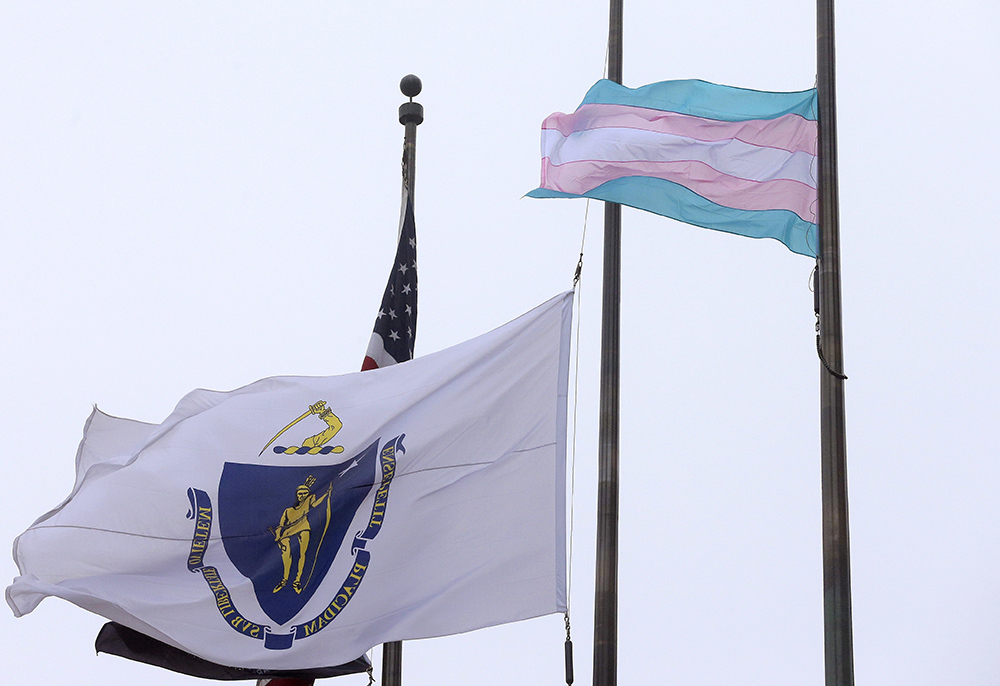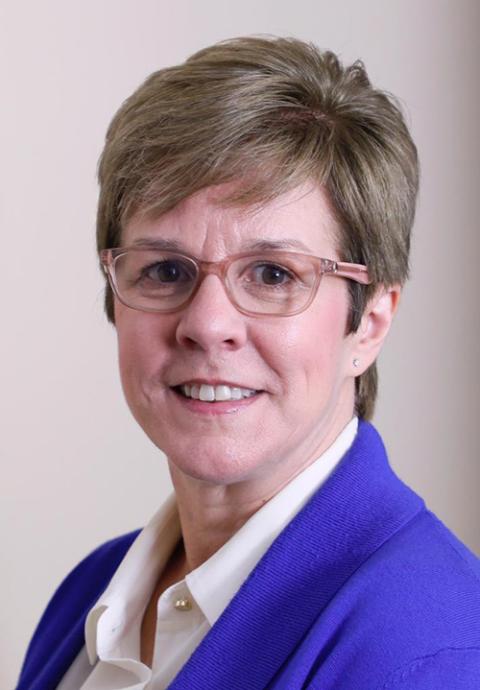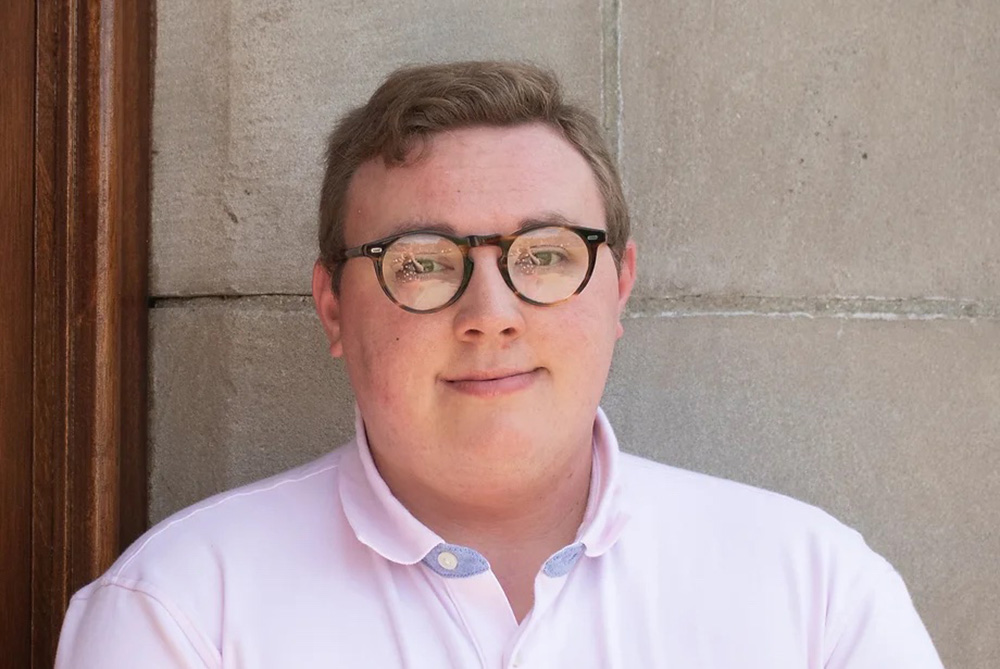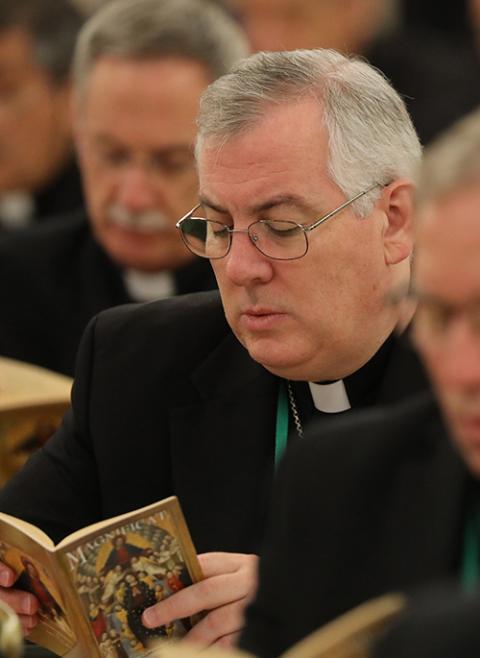
A flag representing the transgender community, foreground, flies next to the Massachusetts state flag and a U.S. flag in front of Boston City Hall in 2016. (AP/Steven Senne)
A member of the committee charged with drafting gender identity guidelines for Catholic elementary and middle school students in the Boston Archdiocese has resigned from the group, citing concerns about its transparency and lack of input from transgender individuals.
The departure of Maureen DiMilla — a licensed mental health counselor and former director of the archdiocese's child advocacy office — came after Boston Auxiliary Bishop Mark O'Connell, the committee's chairman, asked all members of the group to pledge via email that they would not speak to the press or anyone else about the document-drafting process.
O'Connell made the request in the wake of NCR's earlier coverage of the committee's work.
"I didn't feel I could adhere to the request," said DiMilla, NCR's primary source for the initial story. "It is too important of a topic."
Her resignation underscores the conflicting views about the extent of transparency needed and when transparency should occur as a growing number of dioceses in the United States issue policies related to LGBTQ people, particularly those who are transgender.
O'Connell, recently named vicar general and moderator of the curia for the Boston Archdiocese, indicated he had hoped the document's existence and details of the drafting process would be kept confidential until the text was completed or nearly completed. DiMilla and many educators and LGBTQ advocates feel information needs to be shared far sooner.
"There are many, many committees that should be confidential and should be for the entirety of their work," said DiMilla, who spent almost two decades working for the state of Massachusetts in child protection before her career with the archdiocese.

Maureen DiMilla (Courtesy of Maureen DiMilla)
"This committee is different," she said. "It doesn't need to be fully transparent all the time, but there needs to be a level of transparency during the process. Families, teachers and principals and those it will impact in Catholic schools need to know that the archdiocese is working on this type of document and what types of resources they are using to craft it."
O'Connell, speaking publicly for the first time about the guidelines, told NCR in an interview on April 26 he believes sharing the content of the discussions or details about the process while it is underway would inhibit the committee's ability to engage in a complex endeavor thoughtfully and thoroughly.
"At some point, we will speak about our process and how we got there, but people will have to wait until then," said O'Connell.
The bishop said he hopes for "trust in the process" and that the guidelines "should stand up to fair-minded people."
It is crucial to have a variety of voices "committed to coming up with a policy that helps people in a difficult situation," O'Connell said. "But you need to be able to talk about these things, test things and argue them and get behind a position and to listen to others. That can't take place in a public forum."
Both DiMilla and Michael Sennett, a transgender Catholic in the Boston Archdiocese who also spoke to NCR for the earlier story, said that not all conversations within the committee need to be publicized but that it's important to share key elements of the group's approach.
"We've seen the harmful effects of these documents in other dioceses and states," said 27-year-old Sennett. "Transparency is important because the risk is to an already marginalized group, a vulnerable group. Trans people are having these policies written about us, and when we don't know what's going on it puts us in a more vulnerable position. We don't know what's going on until it hits us."
Advertisement
Most dioceses issuing policies nationwide do not give advance notice that they are forthcoming. In many instances, dioceses have provided limited information about how their gender-identity documents were developed and who was involved in the process — a practice that's received ample criticism.
DiMilla said the Boston committee members were not initially told to keep their work secret.
In speaking with NCR about the work earlier this year, she said she wanted to bring some transparency to the process. She also wanted to share some criticisms, including about certain medical claims made by a presenter to the group, the lack of transgender individuals' perspectives, and about the possibility of certain content that in her view is problematic.
The 11-person committee was convened last spring by Boston Cardinal Sean O'Malley, and in June DiMilla asked Sennett if he'd be willing to share his experiences as a transgender Catholic with the group. O'Connell, however, said no to the plan, according to DiMilla.
She said the bishop later expressed an openness to a transgender person reviewing the document, and the archdiocese had asked her for Sennett's contact information.
After the NCR report was published, Sennett received a call from O'Connell during Lent and the two had a short conversation.
The bishop was "very pastoral" and offered an apology, said Sennett. "He said he was sorry if he made me feel excluded and that there had been a misunderstanding, that they had not been at a stage in the process to speak with a trans person."

Michael Sennett, a transgender Catholic in the Boston Archdiocese (Courtesy of Michael Sennett)
Sennett said the bishop also told him that because he'd spoken to the press, he would not have the opportunity to speak with the committee. "He did say I could reach out to him again to recommend folks they should hear from, and that was an important bridge," said Sennett, adding that he thought a transgender individual who was an expert in youths' mental health might be a better option.
O'Connell told NCR that once the committee has completed the bulk of its study and discussions — "when we get to the core of where we're going" — then it will ask other individuals, including the parents of transgender children, for input on the draft.
When asked if the group would speak with a transgender adult who is Catholic, the bishop said someone who struggled with their gender identity only later in life would not be helpful, but someone "who had this issue early might be relevant" to the committee's work. He did not indicate when or if the group would seek out such an individual.
After hearing people's thoughts, "we will come back to the table," said Terrence Donilon, a spokesperson for the Boston Archdiocese, adding the committee is close to requesting outside feedback. He said the process of creating the final guidelines was in the final stages but its release was "not imminent."
"Feedback is crucial," said Sennett. But he believes connecting with families of transgender youths near the end feels like "an afterthought" and that "trans people should be consulted throughout the process."
"It doesn't seem responsible to begin writing guidelines without meeting the people who will be impacted by them," said Sennett.
O'Connell said the committee has taken its time to pursue the process with intentionality.

Boston Auxiliary Bishop Mark O'Connell attends opening prayer at the spring general assembly of the U.S. Conference of Catholic Bishops in Baltimore June 13, 2019. (CNS/Bob Roller)
"On one pole of the issue is the view that if you even think about this you are sinful and on the other pole if you don't do what scientists or sociologists say then that's sinful," said the bishop. "It should not be on these poles where we are writing."
And both ends of the spectrum ignore one another, he said. There are a "wide variety of people" on the committee "and by listening to one another, we are being respectful of both sides. We are trying to do what some people think is impossible."
The bishop said ultimately they are "trying to write a very Catholic document on this issue and speak to people in real situations." People who are transgender and their families "are the audience" of the document "and we are aiming to please them along the way."
"Our goal is not to make a statement but to help people in real situations — help school leaders, parents, help children who are facing a difficult situation," said the bishop. "That's our goal."
At the same time, added O'Connell, "not everyone gets a say in what we do."
DiMilla is hoping the archdiocese will describe how they went about crafting the document at least after it comes out.
Given the Catholic Church's history of secrecy, including past institutional cover-up of clergy sexual abuse in the Boston Archdiocese, "the church needs to be very cautious about being open and not looking like it's covering something up," said DiMilla. "Transparency is an essential component in rebuilding trust."
The Catholic Church, Sennett added, "has not mastered the art of transparency."
DiMilla would like to see a document that affirms school leaders' ability to address situations on a case-by-case basis, as a majority of principals and faculty already are skilled at "supporting and loving and accompanying students who are on this type of journey," she said.
The longtime counselor said she has no regrets about speaking publicly on the committee's work or about resigning. "I believe God put me on this earth to love people and to shine Christ's love," she said. "I strongly believe that’s what I've done, even by my resignation."




